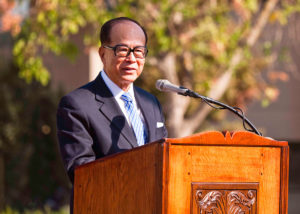During the heyday of China’s economic miracle, being a patriot and a good businessman were one and the same. In late September, legendary Hong Kong business magnate Li Ka-shing 李嘉诚 encountered the wrath of China’s state media and nationalistic netizens when he moved his investments away from China.
A self-made business tycoon, Li is the second-richest person in Asia according to Forbes. His universally recognised business acumen endows his investment decisions with heavy symbolism; the extent of his investments in China had lent China’s economic miracle a kind of additional legitimacy. But in 2013, Li Ka-shing’s Cheung Kong Holdings began slowly restructuring its holdings in the Mainland. It sold off real estate, retail chains, and other assets, shifting its investments to Europe. This sent shock waves through China’s business community. Wang Shi 王石, president of Vanke (one of China’s largest real estate developers), wrote on Weibo that ‘The very shrewd Mr. Li Ka-shing is selling properties in Beijing and Shanghai. This is a signal. Be careful!’
In the wake of China’s summer stock market collapse, some were quick to point the finger at Li for damaging the confidence of investors. On 14 September 2015, a Xinhua affiliated WeChat account published an article titled ‘Don’t Let Li Ka-shing Run Away’. The article charged Li with profiting from China before throwing it by the wayside: ‘In the eyes of the people, Li Ka-shing has thus transformed into a long, sharp-toothed creature, which is regretful.’ The article instructed Li to do three things: pay the people back (for what, it’s unclear), keep at least symbolic holdings in China, and do more philanthropy (despite being famous for the philanthropy he does already, including founding Shantou University in Guangdong province). The attack triggered a deluge of online attacks on Li.
Perhaps fearing that drawing attention to Li’s rationale for moving his money out of China would draw further attention to China’s economic slowdown, government censors quickly called off the attack. A government media directive dated 18 September, which was later leaked, instructed media outlets to ‘stop hyping reports and commentaries on Li Ka-shing divesting from mainland [China]’. State media quickly demonstrated a newfound composure, exemplified by a piece in the Securities Times on 20 September entitled, ‘Let Li Ka-shing go, the sky won’t collapse’.
But it was too late. Cheung Kong Holdings issued a press statement just a few days later. While Li is normally soft-spoken and non-confrontational, the press statement criticised the personal nature of the attacks as showing a ‘cultural revolution mentality’. In the tone of a loyal but aggrieved subject, it noted that Li had not responded earlier for fear of causing a distraction during President Xi’s visit to the US (which coincided with the media frenzy against him). It drew attention to Li’s many philanthropic contributions in the Mainland. He explained his decision to invest abroad as consistent with official policy, pointing to the government’s ‘going out’ 走出去战略 strategy and Xi’s One Belt, One Road Initiative (see Forum ‘One Belt One Road: International development finance with Chinese Characteristics’, pp.244–250). On the topic of his patriotism, Li reflected on his childhood in Chaozhou, Guangdong province, growing up amid war and destruction, and the thirty years of tumult that came after. ‘Of course this made him unhappy,’ the statement read. ‘But he believes [Song and Tang dynasty poets’] Su Shi and Bai Juyi said correctly: “Where there’s home there is heart” and “Where my heart finds its inner peace, I call it my homeland.” ’



